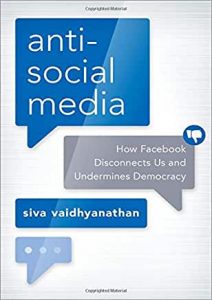Anti-social Media: How Facebook Disconnects Us and Undermines Democracy by Siva Vaidhyanathan was published in 2018; I can’t remember how it came to be in the in-pile. Anyway, it’s an interesting analysis that does what it says in the subtitle, and does so far better than the massively over-hyped and underwhelming Surveillance Capitalism by Shoshan Zuboff the following year. The chapter each focus on a theme: surveillance, attention, privacy, protest etc.
Despite the title – and indeed the conclusion – each is quite measured and nuanced. For instance, I like his definition of privacy: “The word more accurately describes the ways we manage our reputations within and among various contexts,” rather than the all-or-nothing way it’s usually discussed. I’ve been using a similar concept, of “privacy in public,” the wish to reveal specific information to specific people for a purpose. Similarly his co-ordination problem argument for regulating social media rather than leaving it to companies themselves. Or his masterly debunking of the Cambridge Analytica claim to being all-effective at winning the Trump election.
So there’s a lot to like in the book. It doesn’t quite add up though. Although it’s mostly about Facebook, other Big Tech firms slip in as miscreants – so why were they left out in the first place? I suppose attention has turned now to the Musk-ing of Twitter so we’re less focused on Facebook than was the case in 2018, and that doesn’t mean the issues have gone away.
More than that, the regulators and politicians should be part of the story. It has taken until late 2022 for competition authorities to start to get tough, and in the UK the patchy Online Safety Bill is still chugging through the legislative process. Why was the policy world so slow to act? I sometimes wonder what would have happened if social media companies had been regulated as publishers right from the start – an option that was discussed and rejected back in the day. Now there’s an alternative history.


